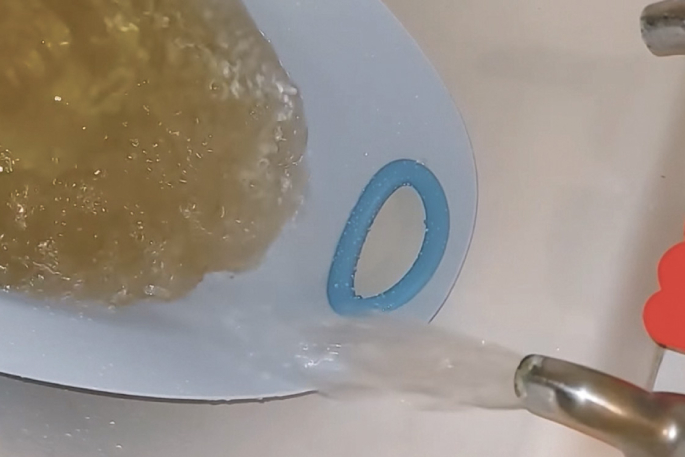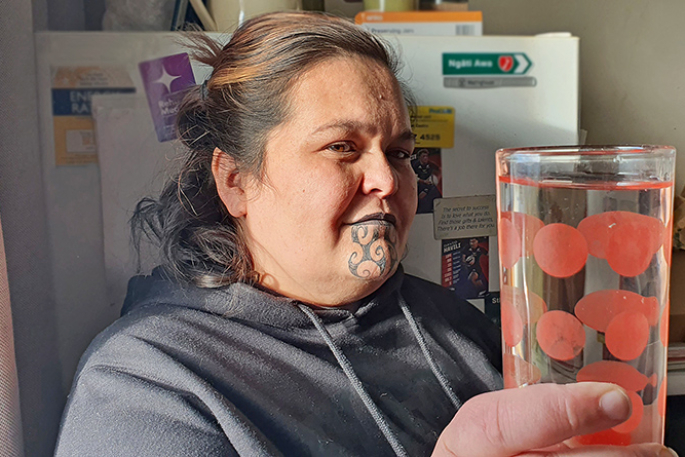Kawerau District Council has been under fire from its community recently about the colour of its tap water.
Ongoing issues with discoloration in the Kawerau water supply have escalated in recent months.
The council says the sporadic browning is due to a build-up of manganese and iron in the water supply infrastructure, which becomes black and brown in the presence of chlorine.
Communications manager Tania Humberstone says the council is working hard to resolve the issue.
She says under normal conditions, the manganese and iron concentrations in the spring water sources were too low to cause any discolouration, however the minerals could build up in the reticulation system.
Staff believe the recent brown colouring may be connected to low water usage during the past nine months due to a lot of rain.
The community, which gets its water from springs and bores, once liked to boast of having the best drinking water in New Zealand. However, the town has been dissatisfied with its water supply since the council began chlorinating it in 2019. This was to comply with incoming Government regulations after the Havelock North water contamination in 2016.
The chlorination resulted in discolouration of the water at the time, and there were many complaints of a strong chlorine taste. Though the colour has improved since then, the recent return of the brown water has reignited the community's concerns.
One of those worried about the colour of the water and the effects it may be having on people's health is Valerie Reid, a Kāinga Ora tenant who has lived in Kawerau for 10 years.
'It's not the same anymore as it was when I first moved here. It doesn't taste good. It doesn't look good. It's just totally disgusting.”
With multiple health problems herself, including epilepsy, respiratory issues, sciatica and migraines, Valerie says it is the older people in the community she is most concerned for, and those with young children.
Valerie says the water is usually at its darkest in the morning after sitting overnight in the pipes.
One of her older friends had told her she had to run the outside hose for a couple of hours before it became clear enough to use and some parts of the town were worse than others.
'My neighbour has a one-year-old. It's not good for baby to drink.”
Valerie says she has emailed Waiariki MP Rawiri Waititi and list MP Tamati Coffey. Rawiri responded that he wants to have a meeting with the district council about it.
'It is a health and safety matter. It is about our future and our kaumatua. How much is it actually affecting them? Our kaumatua can't afford to drink or shower in yucky water.”
She says she had already contacted her Kāinga Ora tenancy manager to let her know about the issue as she was concerned that she would be blamed for staining the porcelain in her toilet.
 One of the many images posted on Facebook showing brown water coming from taps in Kawerau. Photo: Supplied .
One of the many images posted on Facebook showing brown water coming from taps in Kawerau. Photo: Supplied .
Tania says council staff are going through a systematic process to eliminate potential sources.
'Council apologises for these ongoing issues and the impacts on whānau. We appreciate that it is frustrating and impacts residents' lives.”
Among the actions the council are taking are large-scale flushing of the reticulation, cleaning of all reticulation and valves and cleaning and inspecting the district's three water reservoirs.
The council is also in the process of a $12 million replacement of the town's water pipes, over six years, and some of this work has been brought forward from the 2025-26 financial year to the 2023-24 financial year.
The council has three sources for drinking water - Umukaraka Spring, Pumphouse Spring and the Tarawera bores. The Tarawera bores and Pumphouse Spring are on land owned by the council while the Umukaraka Spring is on land managed by Māori Investments.
In the previous three weeks, the council has only utilised the Pumphouse Spring to see if the possible cause was one of the other sources.
From next week, the council will only use the Tarawera bores for a period of three weeks and will revisit the availability to use Umukaraka Spring with the owners.
The council is also evaluating the use of lime in its process and replacing it with other methods. It is also rebuilding the main pump station with modern energy efficient pumps and valves.
Tania says the community could help council staff to solve the problem by telling them where dirty water was occurring.
She says there had been many comments on social media over the weekend from people saying they had complained to the council and they had done nothing.
'But, actually over the weekend we had only two service requests. Please contact the council on 07 306 9009 and if it is after hours, press option 2. This will help staff to pinpoint the causes and rectify the problem.”
Public Interest Journalism funded through NZ On Air




0 comments
Leave a Comment
You must be logged in to make a comment.